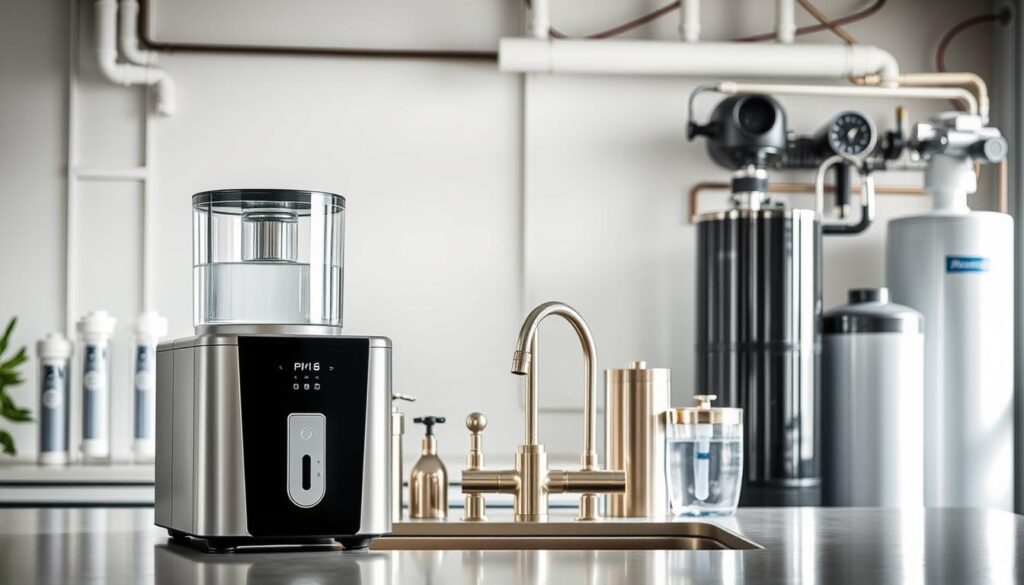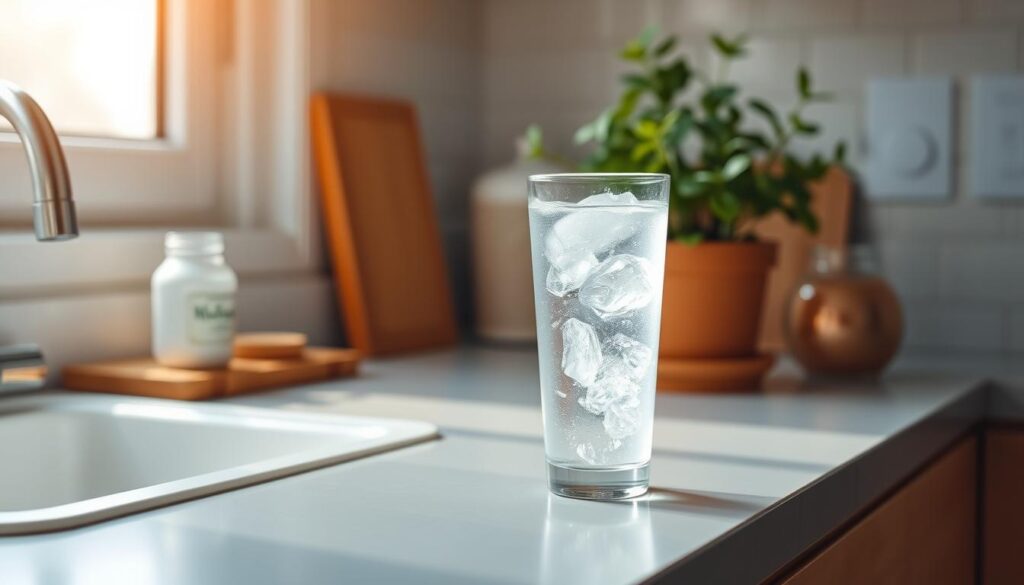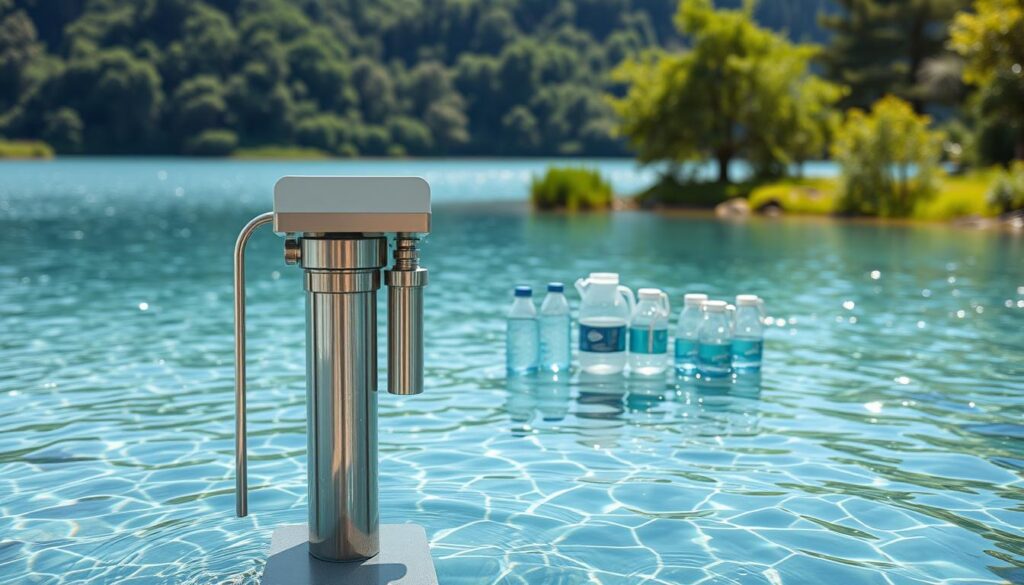Thinking about the quality of water at home made me realize how important a good home water purification system is. Tap water can have many contaminants that change its taste, smell, and safety.
From my experience, having a top-notch drinking water system is key for clean water. This guide will help you pick the best water filtration systems for your home. You’ll learn about the different types and their benefits.
Key Takeaways
- Understand the importance of home water purification systems.
- Learn about common contaminants in tap water.
- Discover the different types of drinking water systems available.
- Find out how to choose the best water filtration systems for your needs.
- Gain insights into the benefits of using a reliable drinking water system.
Understanding the Importance of Water Filtration
Exploring water filtration shows how vital clean drinking water is. It’s key for our health, and filtration ensures its quality.
Why Clean Water Matters
Clean water is essential for us. Bad water can cause health problems, from mild stomach issues to serious diseases. The World Health Organization (WHO) says contaminated water causes about 485,000 diarrheal deaths each year.
“Access to safe drinking water is a fundamental human right, and it’s essential for maintaining public health.” –
Health Benefits of Filtered Water
Filtered water offers many health benefits. It’s free from harmful substances and pollutants. Key benefits include:
- Reduced risk of waterborne diseases
- Lower exposure to heavy metals like lead and mercury
- Improved overall health and well-being
Filtered water also tastes better. The best water filters can remove up to 99% of contaminants, ensuring safe drinking water.
Environmental Impact of Water Filtration
The environmental impact of water filters depends on the technology used. Some, like reverse osmosis, use a lot of energy and waste water. But, many modern systems are designed to be energy-efficient and use sustainable materials.
| Filtration Type | Energy Consumption | Waste Generation |
|---|---|---|
| Activated Carbon | Low | Low |
| Reverse Osmosis | High | Moderate |
| UV Filters | Moderate | Low |
When picking a water filter, think about the environment. Choose water treatment solutions that are good for the planet.
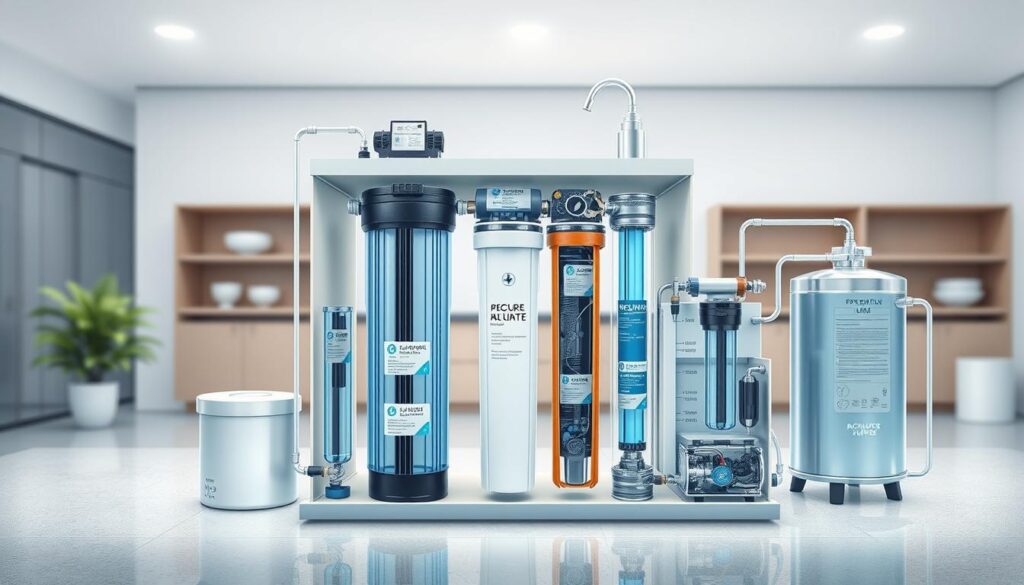
Types of Water Filtration Systems
The market has many water filtration systems, each with its own benefits. Knowing the differences helps you choose the right one for you.
Activated Carbon Filters
Activated carbon filters are very popular. They remove bad tastes and smells from water. They also get rid of chlorine, VOCs, and other chemicals. But, they might not catch heavy metals, nitrates, or germs.
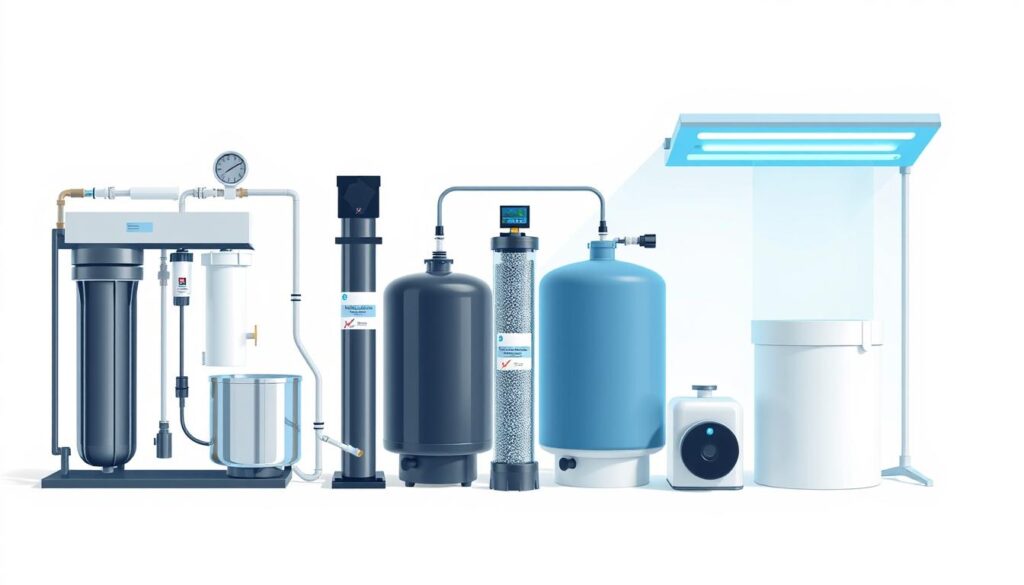
Reverse Osmosis Systems
Reverse osmosis (RO) systems use a special membrane to filter out many contaminants. They make very clean water. But, they can also take out good minerals. You might need extra steps to add minerals back or improve taste.
“Reverse osmosis is one of the most effective methods for purifying water, making it a popular choice for households and businesses alike.”
UV Filters
UV filters kill bacteria, viruses, and other germs in water. They’re great for water that’s full of germs. But, they don’t catch particles or chemicals. So, they’re often used with other filters.
Faucet-Mounted Filters
Faucet-mounted filters are easy and affordable. They attach to your faucet to filter water. They use activated carbon or other tech to clean water. They’re not as thorough as some systems, but they’re a simple way to make water better.
Assessing Your Water Quality
Knowing the quality of my water is key to picking the right home water purification system. To make a smart choice, I must first check the current state of my water.
Testing for Contaminants is a vital step. I can use a water testing kit to find out if my water has lead, chlorine, or bacteria. The Environmental Protection Agency (EPA) says regular testing is essential for safe drinking water.
“The EPA regulates contaminants in drinking water to protect public health,” a statement that highlights the need for water quality testing.
Testing for Contaminants
There are many ways to test water quality, like DIY kits or professional lab tests. I can pick the best method for my needs. For example, if I think my water has specific chemicals, a lab test might be better.
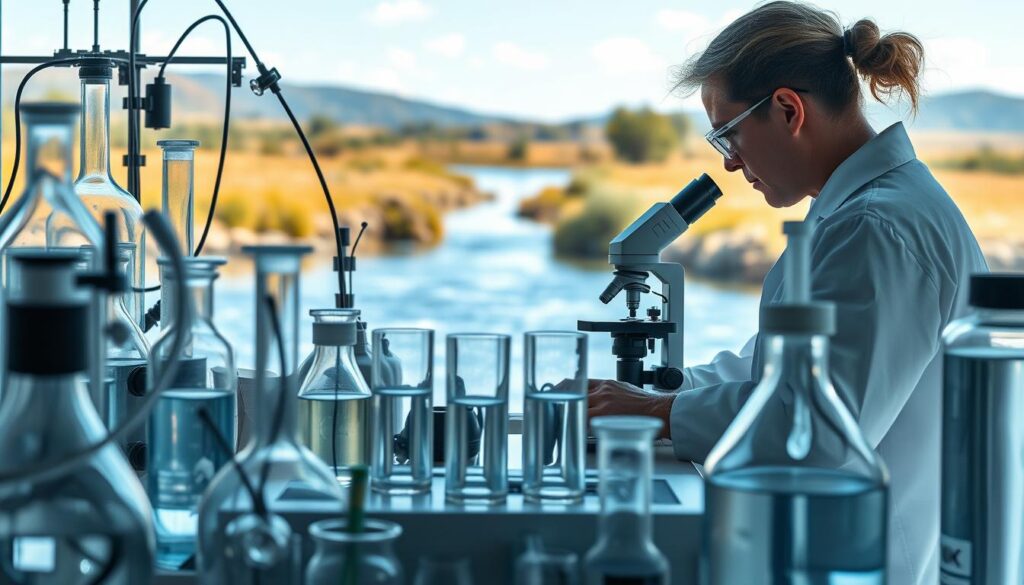
Identifying Your Water Source
Knowing where my water comes from is also important. Whether it’s from a city supply, a well, or somewhere else, it affects what contaminants it might have. For example, well water might need different tests than city water.
Evaluating Local Water Concerns
Looking into local water issues is also key. Problems like industrial pollution or farm runoff can affect my water. I can talk to my local water utility or health department to learn about these issues. A water quality expert says, “Local conditions greatly influence drinking water quality.”
By taking these steps, I can fully understand my water quality. Then, I can choose the best drinking water system for my needs.
Key Features to Look For
To find the perfect water filtration system, I need to look at some important characteristics. Several key features stand out when choosing the best water filters.
When I’m looking for a water filtration system, understanding key features is essential. These features affect the system’s performance and my satisfaction with it.
Filtration Capacity
The filtration capacity is a critical factor. It’s the amount of water the system can filter before needing a filter replacement. I need to think about my household’s water usage. Larger households might need systems with higher capacities.
Flow Rate
The flow rate is also important. It measures how fast the system filters water. A higher flow rate means I get filtered water quicker. This is great for large families or those who prefer continuous filtered water.
Filter Lifespan
The lifespan of the filter is vital. Filters that need frequent replacements can be inconvenient and expensive. I should look for systems with longer-lasting filters to reduce maintenance.
Comparing Key Features
To make a good choice, I can compare different water filtration systems’ key features. Here’s a table comparing three popular systems:
| Water Filtration System | Filtration Capacity (Liters) | Flow Rate (Liters/Minute) | Filter Lifespan (Months) |
|---|---|---|---|
| System A | 500 | 2 | 6 |
| System B | 1000 | 3 | 12 |
| System C | 2000 | 4 | 18 |
Looking at this table, System C has the highest capacity, flow rate, and filter lifespan. It might be the best choice for me.
In conclusion, when picking a water filtration system, consider key features like filtration capacity, flow rate, and filter lifespan. By comparing these, I can choose a system that fits my needs.
Assessing Costs and Budgeting
When planning for a water filtration system, it’s important to look at both the initial and ongoing costs. Understanding these costs helps make a smart choice.
Initial Purchase Price
The cost of a water filtration system can change a lot. It depends on the system’s type and quality. For example, simple faucet-mounted filters are cheaper, but more advanced systems like reverse osmosis or whole-house systems cost more.
Think about what matters to you, like how much water it can filter, how fast it filters, and how long the filters last. For more info on budgeting for water treatment, check out this guide.
Ongoing Maintenance Costs
Don’t forget about the costs of keeping your system running. This includes replacing filters, buying maintenance supplies, and any repairs. How often and how much you’ll spend on replacements can vary a lot.
Some systems need new filters every few months, while others can go longer. Make sure to include these costs in your budget to keep your system affordable over time.
Cost-Effectiveness Over Time
When looking at the cost of a water filtration system, think about both the initial cost and the ongoing expenses. A system that costs more to buy but less to maintain might be cheaper in the long run.
Here’s a comparison of different water filtration systems to help you see this:
| System Type | Initial Cost | Annual Maintenance Cost | 5-Year Total Cost |
|---|---|---|---|
| Faucet-Mounted Filter | $50 | $20 | $150 |
| Reverse Osmosis System | $200 | $50 | $450 |
| Whole-House Filtration System | $1,000 | $100 | $1,500 |
The table shows how different systems can affect your total cost over time. By looking at these costs, you can choose a system that fits your budget and meets your needs.
Installation Options
It’s important to know the installation options for water filtration systems. This is key for a smooth setup in my home’s plumbing. The process changes based on the system type, like whole house filtration, and my home’s plumbing setup.
DIY Installation vs. Professional Help
I have to decide if I’ll install the system myself or get a pro. DIY is cheaper and works for simple systems like faucet filters. But, complex systems like whole house filters need a pro for correct setup and to fit with my plumbing.
The Water Quality Association says, “Professional installation makes sure the system works right and follows local codes.”
- DIY is good for simple systems and saves money.
- For complex systems, getting a pro is best to ensure proper setup and follow local rules.
Space Considerations
Space is another big factor. Different systems need different amounts of room. Whole house systems take up more space because they go at the water entry point.
| System Type | Space Requirement | Typical Installation Location |
|---|---|---|
| Faucet-Mounted Filters | Minimal | Directly on the faucet |
| Whole House Filtration | Significant | Point of entry for the home’s water supply |
| Under-Sink Filters | Moderate | Under the sink |
Plumbing Requirements
Plumbing needs are also key. Some systems, like reverse osmosis, need extra plumbing for waste. I need to check my plumbing to pick the best setup.
“The plumbing needs for water filtration systems can change a lot. It’s important to think about these needs early to avoid expensive changes later.” –
When looking at plumbing needs, I should also think about the system’s flow rate and water pressure. These affect how well the system works.
By carefully looking at these options and considering DIY vs. pro, space, and plumbing, I can choose wisely. This ensures my water filtration system works well and meets my needs.
Maintenance and Upkeep
To keep my water filtration system working well, regular maintenance is essential. This includes several important tasks. They help extend the system’s life and keep it effective.
Regular Filter Replacement
Replacing filters is a key maintenance task. How often you need to replace them depends on the filter type and the manufacturer’s advice. Activated carbon filters usually need to be replaced every 6 to 12 months. Reverse osmosis membranes can last up to 2 years.
Keeping a maintenance log helps me remember when to replace filters. Here’s a simple table to show a typical replacement schedule:
| Filter Type | Replacement Interval |
|---|---|
| Activated Carbon | 6-12 months |
| Reverse Osmosis Membrane | 1-2 years |
| UV Filter | 6-12 months |
Cleaning Your System
Cleaning the system is also important. For systems with a pre-filter, cleaning or replacing it regularly helps prevent clogs. The cleaning method can vary. Some systems just need a rinse, while others need a more detailed cleaning with a special solution.
“Regular cleaning and maintenance not only improve the taste and odor of the water but also extend the lifespan of the filtration system.”
Troubleshooting Common Issues
Even with regular maintenance, problems can happen. Common issues include reduced water flow, leaks, or bad tastes and odors. Troubleshooting these problems often involves checking for clogged filters, looking for leaks, or sanitizing the system to remove bacteria.
If I notice a decrease in water flow, I first check the pre-filter for clogs. If the problem continues, I look for kinks or blockages in the system’s tubing. Here’s a list of common problems and their possible causes:
- Reduced water flow: Clogged pre-filter or filter, kinked tubing
- Leaks: Loose connections, damaged O-rings
- Bad taste or odor: Expired or clogged filters, bacterial growth within the system
Understanding these common issues and their solutions helps me keep my water filtration system running well.
Comparing Top Brands and Models
Choosing the right water filtration system is important. It’s key to compare top brands and models. This helps you pick the best one for your needs.
Popular Water Filtration Brands
Several brands are known for their quality and reliability. Aquasana, Britta, and ZeroWater are leaders in water filtration. Aquasana is known for removing many contaminants and improving water taste.
Consumer Reviews and Ratings
Reviews and ratings offer insights into water filtration systems. They show how well systems work and how reliable they are. For example, ZeroWater filters are praised for removing contaminants. Yet, some users mention they need to replace filters often.
- Check online reviews on platforms like Amazon and Home Depot.
- Look for ratings from independent testing organizations.
- Consider feedback on the manufacturer’s website.
Feature Comparisons
When comparing systems, look at key features. These include how much water they can filter, how fast they filter it, and how long the filters last. For example, reverse osmosis systems like Berkey filter a lot of water but filter it slower than activated carbon filters.
| Brand | Filtration Method | Flow Rate | Filter Lifespan |
|---|---|---|---|
| Aquasana | Activated Carbon | High | 3 months |
| ZeroWater | Reverse Osmosis | Medium | 6 months |
| Berkey | Gravity Fed | Low | 12 months |
By comparing these features and reading reviews, you can choose the best water filtration system for you.
Making My Final Decision
When choosing a water filtration system, it’s key to think about what I really need. I should look at how well different water treatment solutions work against various contaminants. I also need to consider how easy they are to maintain.
Personal Needs Assessment
I must pick a system that fits my personal taste. This means looking at the level of filtration, how fast the water flows, and how long the filters last. Knowing these details helps me make a choice that’s right for my home.
Warranty and Support Considerations
The warranty and support from the maker are also important. A good warranty gives me confidence and protects my investment in a water filter.
Final Considerations
In the end, my choice will be based on the system’s features, cost, and benefits. By weighing these, I can find a system that gives me clean water. It will also meet my needs and stay within my budget.
FAQ
What are the most effective water filtration systems for removing contaminants from drinking water?
Reverse osmosis systems and activated carbon filters are top choices. They remove chlorine, lead, and volatile organic compounds (VOCs) from water.
How often should I replace the filters in my water filtration system?
Filter replacement depends on the type, usage, and manufacturer’s advice. Usually, filters need to be changed every 6-12 months for best results.
Can I install a water filtration system myself, or do I need professional help?
You can install some systems, like faucet-mounted filters, yourself. But, whole house systems might need a pro due to plumbing issues.
How do I know if my water filtration system is working effectively?
Use a water testing kit or send samples to a lab to check water quality. Regular maintenance and filter changes also ensure effectiveness.
Are whole house water filtration systems worth the investment?
Yes, they’re worth it for homes with multiple water sources. They offer broad protection against contaminants and enhance water quality.
What is the difference between a water filtration system and a water purification system?
Water filtration systems remove contaminants and impurities. Water purification systems, like reverse osmosis, aim to remove almost all impurities, including dissolved solids.
Can a water filtration system improve the taste and odor of my drinking water?
Yes, many systems, like those with activated carbon filters, can enhance taste and odor. They remove chlorine, VOCs, and other impurities that affect flavor and smell.
How do I choose the right water filtration system for my home?
Consider your water quality, filtration capacity, flow rate, filter lifespan, and budget. Evaluating your needs and comparing systems will help you choose wisely.

